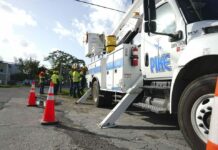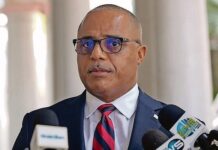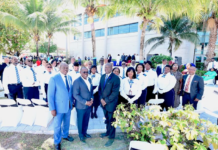STATEMENT: When the Davis administration took office in September 2021, the country was in crisis.
The new government inherited a fiscal emergency, hospitals in disrepair, schools shuttered, record unemployment, and a failing BPL, which was saddled with more than $500 million in debt. The government had to urgently loan BPL $100 million just to keep it afloat.
And yet, just weeks before the general election, the Minnis-Pintard administration kept spending money they didn’t have, on a reckless $14 million land deal tied to a project they knew had no path forward.
Bahamas Power & Light (BPL) had made it clear: the only way to close the land deal was with proceeds from the Rate Reduction Bond (RRB). The same RRB the FNM had failed to execute — and knew wouldn’t happen.
Despite this, in August 2021 — weeks before voters went to the polls — they were still throwing big money at it. In October 2020, they had already authorized a $5.26 million payment and signed a $9.8 million promissory note. Then, in April 2021, they paid an additional $2 million simply to obtain a short extension. The original closing date was December 1, 2020.
By the time we took office, the promissory note had already been amended three times.
BPL’s lawyers attempted to renegotiate — to at least retain a portion of the land equal to the $7 million already spent — but those efforts were met with silence from the vendor.
No legal safeguards were put in place in this arrangement under the previous government. No protections for public money. No guarantees to recover what had already been spent.
Worse still, the Minnis-Pintard administration knew they were at a standstill with Shell and could not reach an agreement to move the LNG plant forward. Still, they proceeded, deepening BPL’s financial woes without a credible plan. Why?
The same people who approved the purchase of seven engines they knew could not burn LNG fuel, are still trying to justify a land deal for a plant that would never be built.
During the pandemic, significant clean energy investments were made across the region — but not in The Bahamas.
The Minnis-Pintard administration:
• Failed to lower electricity prices
• Failed to stabilize the electricity supply
• Failed to modernize the grid
• Failed to strengthen the system to withstand storms
• Failed to move us toward clean energy
• Failed to clean up BPL’s finances
But weeks before the election, with sky-high unemployment and suffering across the country, they were rushing forward with a land deal worth millions — despite no funding, no project, and no protections.
This wasn’t a transition failure. It was a deliberate, reckless decision by an outgoing administration.
Now they complain that the Davis administration didn’t rescue them from their own malpractice.
What’s most fascinating is Mr. Pintard’s reflexive loyalty to failures he pretends to have had no part in. He defends even the most disastrous decisions of the Minnis administration, even when those decisions cost the Bahamian people millions.
Mr. Pintard knows what we all know: the FNM never had a viable, structured plan for energy reform. If he disagrees, he should make it public. The Bahamian people deserve to see a plan they were promised over and over, but never received.







